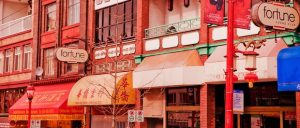The origins of Vancouver’s Chinatown are rooted in racist legislation like the Chinese Immigration Act (Apology for Historical Wrongs, n.d.). Enacted in 1923 and repealed 1947 (only 70 years ago), it discriminated against Chinese people by restricting their entry into Canada through policies such as a $50.00 head tax, which in 1923 was equivalent to $708.70 CAD today (Apology for Historical Wrongs, n.d.). Other discriminatory laws included an 1876 Provincial Act in British Columbia that denied Chinese males voting rights (Apology for Historical Wrongs, n.d.).
Judy Tzu-Chun Wu documents the effects of similar exclusionary immigration laws in 19th century America in “Asian American History and Racialized Compulsory Deviance”, stating that they created gender imbalances manifesting in the lack of nuclear families, and the creation of bachelor societies (Wu, 2003). Wu uses the term “compulsory sexual deviance” to describe a groups’ failure to obtain heteronormative ideals as a result of state legislation (Wu, 2003). This compulsory sexual deviance, along with large anti-Chinese sentiment from non-Chinese groups, kept Chinese immigrants confined in their own communities, as they were localized sources of support and familiarity – these communities would become known as “Chinatowns”.
Laws like the Chinese Immigration Act also reinforced compulsory sexual deviance by heavily restricting the immigration of Chinese wives and children (Chinese Immigration Act, 1923, 2017), which in addition to anti-miscegenation laws, resulted in the systemic isolation of male Chinese-Canadian immigrants in Canada and the creation of bachelor societies (Wu, 2003). These bachelor societies can still be located in historical buildings in Downtown Vancouver, one being the May Wah Hotel on East Pender Street (Historic Study of the Society Buildings in Chinatown, 2005). The May Wah Hotel offered living space for renters, all of whom were Chinese, as well as social areas such as gambling halls, and temporary accommodations that could be used for engaging with sex workers (Historic Study of the Society Buildings in Chinatown, 2005). The forced all-male make up of early Chinatown resulting in bachelor societies like the one documented at the May Wah Hotel is an example of homosociality, a term coined by Eve Sedgewick to describe the social bonds between people of the same sex (Hammarén and Johansson, 2014).

The power dynamics of the laws that forced the creation of homosocial, and possibly heterosexual racialized bachelor societies can be analyzed using Cathy Cohen’s discussion of “straight queers” in “Punks, bulldaggers and welfare queens: the radical potential of queer politics?”, where she describes them as heterosexuals who find themselves on the outside of heteronormativity (2005), which many of these Chinese immigrants did as result from compulsory sexual deviance.
By understanding “queer” as “non-normative” and reflecting on the non-(hetero)normative lifestyles led by many of the residents of the May Wah Hotel – including the bachelor societies, the difficulty in obtaining heteronormative ideals like monogamy and nuclear families due to racist legislation, and engagement with sex workers (Historic Study of the Society Buildings in Chinatown, 2005) – one is able to see how different components of identity, such as race, intersect to make it so not all heterosexual people benefit from heteronormativity (although it’s crucial to acknowledge that non-heterosexual people are unable to access the straight privilege heterosexual people have). It’s also important to note that it wasn’t these peoples’ ethnicities that caused them to have fewer rights than other Canadian citizens, but the Canadian government’s explicit targeting of their racialized bodies, notably after the completion of the Canadian Pacific Railway in 1885, which exploited many of those same bodies for labour. The effects of compulsory sexual deviance are still felt by later generations – this is demonstrated when Wu mentions Nayan Shah’s concept of “queer domesticity” which describes early 20th century dynamics of Chinese families in San Francisco who perpetuated the same heteronormative familial depictions many were cut off from before, in order to better assimilate into western settler communities (Wu, 2003). This need to present an image that made it easier to fit in with dominant power structures further marginalized non-heteronormative Asian-American identities and lifestyles, including bachelor societies and prostitution (Wu, 2003). Examining “queer” as not only being exclusive to the LGBT community through such specific sites like the May Wah Hotel helps us locate other marginalized positions where Cohen says that radical potential is found, and hopefully allow us to utilize that potential with multiple intersections in mind (Cohen, 2005).
Citations:
Apology For Historical Wrongs Against Chinese British Columbians.(n.d.). Retrieved from https://www2.gov.bc.ca/assets/gov/british-columbians-our-governments/our-history/historic-places/documents/heritage/chinese-legacy/written-submissions/lee_howe.pdf
HISTORIC STUDY OF THE SOCIETY BUILDINGS IN CHINATOWN. (2005). Retrieved from http://vancouver.ca/files/cov/historic-study-of-the-society-buildings-in-chinatown.pdf
Chinese Immigration Act, 1923. (2017). Retrieved from www.pier21.ca/research/immigration-history/chinese-immigration-act-1923.
Hammarén, N. & Johansson, T. (2014).Homosociality. SAGE Open 4(1), doi:10.1177/2158244013518057.
Barman, J. (2013). BEYOND CHINATOWN: Chinese Men and Indigenous Women in Early British Columbia. BC Studies, 39–47. Retrieved from search-proquest-com.ezproxy.library.ubc.ca/docview/1438645427?pq-origsite=summon&accountid=14656.
Cohen, C. J. (2005). Punks, Bulldaggers, and Welfare Queens. Black Queer Studies, 21–51. doi:10.1215/9780822387220-003.
Wu, J. T.-Z. (2003). Asian American History and Racialized Compulsory Deviance. Journal of Women’s History 4(3), 58-62. Retrieved from https://search-proquest-com.ezproxy.library.ubc.ca/docview/203247139/fulltextPDF/DE1CBA79C5E94425PQ/1?accountid=14656
Ballegeer, S. (2010, June 14). May Wah Hotel, Chinatown, Vancouver [Digital image]. Retrieved November 7, 2017, from https://www.flickr.com/photos/uncle_buddha/4718223240
